A Channel to Link the Oceans, or the Ortega Syndrome
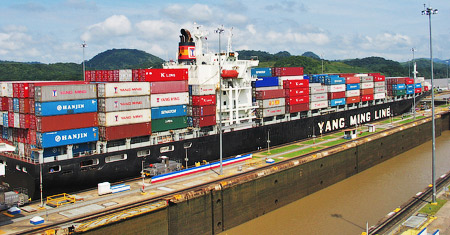
Estimates show that the waterway – an alternative to the Panama Canal – would cost $30-35b to build, but the returns on the investment are expected to be quick as in the XXI century the world increasingly relies on shipping for cargo transit. The design is that the Canal will integrate the San Juan River and some of its tributaries with Lake Nicaragua, and then cut across 20 km of land. The avenue, supposed to be 286 km-long and 22 m-deep, may be phased in by 2019, allowing for the throughput of 270,000 tons annually.
Even upgraded, the Panama Canal will not be able to accommodate latest-generation vessels. The reaction to the Nicaraguan initiative voiced by the Canal Administration was nevertheless completely reasonable – its current Administrator Alberto Alemán Zubieta said that competition is in any case a positive phenomenon and creating new infrastructures would be good for the region.
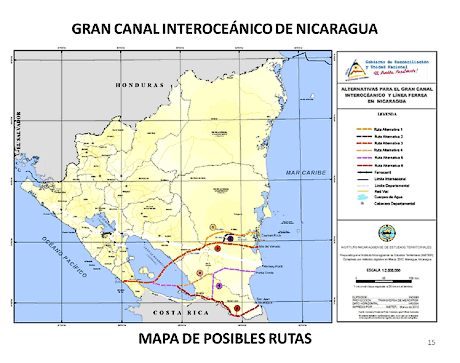
Washington displayed no emotion in connection with Ortega's plan. As WikiLeaks releases showed, the related information used to reach the US Administration on a regular basis, and – given the Panama Canal's chronic congestion, with ships stuck in lines and transit companies losing money – the US Department of State, the Pentagon, or the US intelligence community should not frown on efforts to open up additional routes. The problem is that Nicaraguan leader D. Ortega is solidly in the populist camp, shares socialist ideals, enjoys the friendship of the Castro brothers, and subscribes to the anti-US policies championed by Venezuela's H. Chavez. Ortega is independent in foreign politics and is known to ignore Washington's messages if they run contrary to his own plans. The implementation of the Canal project would help the Sandinistas reinforce their positions in the country and the ALBA bloc – its influence on the continental level. Ortega is a vocal proponent of the concept that the construction of the waterway is the cause to benefit entire Central America.
With the US ambitions to maintain undivided control over the Asia Pacific region, the US Administration deems it necessary to oppose the initiative aimed at creating a transit route outside of its control, even if a different approach could prove to be more practical. The Canal managed by Ortega's regime is seen in Washington as a threat to the US interests.
Washington is particularly allergic to the part of the plan which implies that Iran should invest in the construction. A US tradition since the G. Bush epoch is to condemn Ortega's policy of engaging with Ahmadinejad and to allege that Nicaragua somehow cooperates with Hezbollah. The Western media revive frequently the myth of the Iranian threat in Central America. For example, an Israeli radio station aired a fake report about a Hezbollah training base functioning in the north-eastern part of Nicaragua. The Washington Post blew out of proportions the news that some huge building was being constructed in Managua for the Iranian embassy. The account took little time to be identified as another lie, but US Secretary of State H. Clinton cited it in an attempt to expose Tehran's “terrorist” plans. In fact, this is how the mushrooming of Iranian diplomatic missions in Latin America is interpreted across the West. Formerly, there used to be five of them – in Cuba, Argentine, Brazil, Mexico, and Venezuela – but new ones were established in Columbia, Chile, Ecuador, Uruguay, and Bolivia when Ahmadinejad rose to power. From the US perspective, the involvement of Iran in the construction of the Canal to link the two oceans undermines the security in the Western Hemisphere.
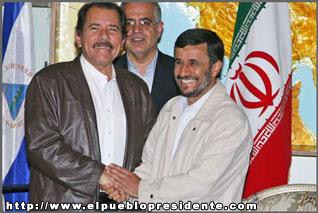
Virtually all of the US ambassadors to Nicaragua took roles in conspiracies targeting Ortega. Paul Trivelli and Robert Callahan were recurrently unmasked as the puppeteers behind the Nicaraguan opposition and NGOs which permanently play into the hands of the CIA. After a series of scandals around Callahan who tried to practice whip and carrot policies vis-a-vis Ortega, mixing threats to cut off financial aid with pledges of low-cost assistance, a new US ambassador – Phyllis Powers, a muscular blond with cold eyes – landed in Managua. Powers has a record of diplomatic service in Russia, Poland, Peru, Columbia, and Panama and, thanks to tight cooperation with the intelligence community, of fighting successfully against drug trafficking and terrorism from out of the US Department of State. It is an easy guess in the light of the above that she owes the appointment to Nicaragua to her tenure in Panama, and, no doubt, the plan for the Canal construction will be at the focus for the US embassy in Managua. The to-do list includes the collection of information on the project, the generation of recommendations on how to prevent it from materializing, and the orchestration of a propaganda campaign meant to discredit the initiative.
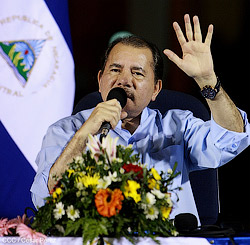
As for the latter, there is no shortage of arguments against the Canal project in the global media. Claims are being made that Ortega downplays the investment requirements which may actually be as high as $50-60b and that the Canal would take decades, if not ages, to redeem. Nicaragua expects to own 51% in the construction consortium, and the media urge the potential holders of the rest – China, Japan, Venezuela, South Korea, etc – to carefully weigh the profitability of what they are being offered, as the workload for the Canal may be lower than projected due to the traditional loyalty of transit companies to the Panama Canal. Russia is warned against taking a role in the Nicaraguan project to be able to better handle its more pressing Northern Maritime Route and Trans-Siberian Railway issues.
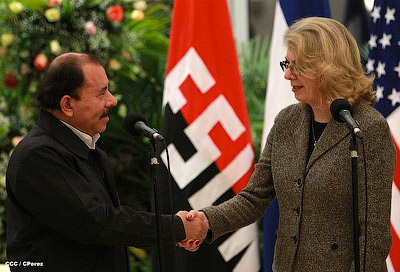
Talking to ambassador Powers at her inauguration ceremony, Ortega suggested switching to a friendlier than before mode of relations. The US embassy has a reputation for propping up the resistance to Ortega's allegedly authoritarian rule. The book by Nicaraguan Army colonel Victor Boitano published recently in the country gives a good idea of the intensity of the CIA subversive activity against it. For a period of time, the author, was connected to the CIA station in Managua. He identified the CIA agents whom he met at secret locations, some of the people being politicians or journalists, and also published a letter with the CIA instructions along with an array of similar documents. Boitano details the steps taken by the CIA to compromise the November, 2011 elections in Nicaragua and the roles played in the process by agents of influence from other Latin American countries such as Costa Rica, Columbia, Mexico, Argentina, and Salvador. According to Boitano, Washington poured $30m into Nicaragua in a hope to plunge the country into chaos. Still, the operation produced no result and Ortega emerged as the winner.
The US shows no signs of abandoning the policy aimed at manipulating the electoral campaigns in other countries. Powers arranged for a meeting with the journalist community with an aye to the upcoming municipal elections, calling Nicaraguans to closely monitor the poll and to support democracy in the country. Ortega refrained from commenting on the event which clearly bordered on meddling with the domestic affairs of Nicaragua. Watchers from various groups – in particular, from the Organization of American States which Ortega has criticized on a number of occasions as an instrument of the US influence over the continent – will certainly be scrutinizing the elections, but whatever they say the public opinion surveys steadily give the victory to FSLN (The Sandinista National Liberation Front). The credentials Ortega's team presents to the constituency are the Nicaraguan socioeconomic programs, bold measures to improve education and healthcare, and a record of extensive housing construction.
With the populist triumph in sight, the US embassy places its bet on a smear campaign targeting Ortega. As in Venezuela, a cohort of journalists for hire are employed in Nicaragua to level accusations against the country's leader on any occasion. Juan Ramon Flores is a champion in the sport of relaying to the audience the US anti-Ortega invectives. His writings betray vehement hate and the desire to eventually do away with the Nicaraguan leader who dares to defend the interests of his country and to uphold the belief in a world without dictate. Flores draws massively from the Cold War legacy, which is quite revealing of his personal background. In his portrayal, Ortega i a “furher” of the FSLN party, an imitator of “the Venezuelan gorilla” Chavez, and a politician with the intellectual horizons narrower than those of Heinrich Himmler. Flores charges Ortega with stealing the financial aid flowing in from Venezuela and with lightheartedly tolerating drug cartels. It is odd that a journalist who churns out such stuff also airs the perception that freedom of speech is missing in Nicaragua.
* * *
In my view, Washington's undisguised hostility to Ortega is extremely alarming. Over the past year, the CIA frequently used the weapon of incurable diseases to neutralize defiant leaders in Latin America. Hugo Chavez, Christina Fernandez de Kirchner, or Luiz Inacio Lula Da Silva – Ortega's peers who had to fight against cancer – could tell him that the threat is real. Hopefully, he is mindful of their lessons.